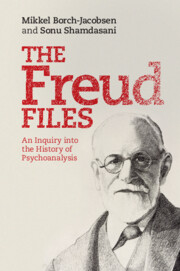4 - Policing the past
Published online by Cambridge University Press: 05 June 2012
Summary
I have a wide experience in what people report as having discussed with my father, or heard him say, and it is always untrue.
Anna Freud to Kurt Eissler, 27 January 1951At the outset of this book, we posed the question as to why psychoanalysis – a discipline apparently dealing with the past – is so allergic to history. The reason has now become clear: historical inquiry, by its very nature, poses a threat to the foundations of psychoanalysis, to its very identity. This is not only because historians have separated Freud’s theory from the plethora of legends which surrounded it, as if it was a question of freeing the rational and empirical kernel of psychoanalysis from its mythical, political and speculative coverings. Through making evident the discrepancies between Freud’s accounts and the material of which he spoke, through demonstrating the process of construction which his legendary narratives were deployed to conceal, through showing the fabrication of psychoanalytic facts prior to their crystallisation into objects of cultural consensus, the work of Freud historians has made it apparent that there never was a kernel.
This is not to suggest that historians have finally unveiled the truth of Freud’s accounts or of his patients. That Sergius Pankejeff or Ernst Lanzer, for example, may have rejected this or that interpretation of Freud tells us nothing about the validity or utility of the latter. Freud’s patients are not necessarily any more trustworthy than Freud and their disagreements with him were part and parcel of the game of analysis, of the conflict of interpretations. However, through bringing to light the arbitrariness behind Freud’s narrative interprefactions, historical study relativises and delegitimates the theory of psychoanalysis much more effectively than any epistemological critique. Instead of attempting to demonstrate that Freud could not prove (verify, test, validate) what he proposed – which has never stopped people from being convinced of the persuasive force of his accounts – historical critique calls into question the hermeneutic pact between Freud and his readers through revealing the unreliability of his texts and rendering them suspect. How is one supposed to continue to believe everything he says, when faced with the accumulation of half-lies, misleading assertions, stylistic equivocations and significant omissions? Why should one continue to attribute him a privileged access to the ‘unconscious’, once it has become clear how he continually evokes this to silence those who were not in agreement with him? And why should we continue to have faith in his self-portrayals, rather than the contrary statements of some of his patients and former colleagues and adversaries, once it has transpired that at times he manipulated the clinical givens to make them say what he wanted them to? In sum, Freud can no longer be regarded as an always reliable witness. Or rather, he is one witness amongst others, and one with particular stakes and interests.
- Type
- Chapter
- Information
- The Freud FilesAn Inquiry into the History of Psychoanalysis, pp. 235 - 299Publisher: Cambridge University PressPrint publication year: 2011



